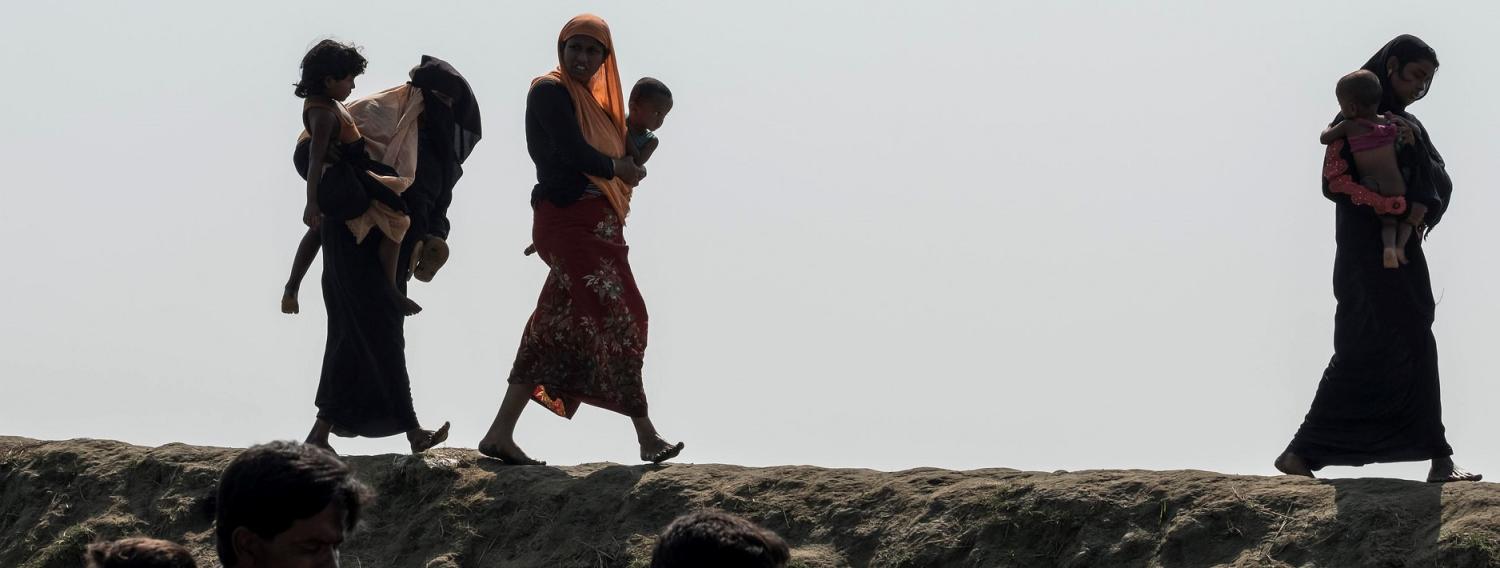Myanmar and Bangladesh recently announced an agreement for the repatriation of Rohingya refugees living in Bangladesh to return to Myanmar. After Pope Francis visited both countries last week, international attention has again focused on chances of a breakthrough to this crisis – envisioning how a peaceful, negotiated solution might look is an urgent task.
While the details of the deal remain hazy, a few basic facts have emerged. The agreement builds on a memorandum signed between the governments of Myanmar and Bangladesh following a similar Rohingya refugee crisis in 1992-3. Myanmar has agreed to resettle refugees in temporary camps, protect their freedom of movement and issue identity cards to those who can prove they previously resided in the country. But as Luke Hunt notes, the requirements to prove residency are unrealistically stringent: people chased out of burning homes and forced to flee violence, often without any supplies, will find it all but impossible to provide paperwork to prove they or their kin lived in Myanmar.
Besides, the agreement is only the first step on the long road to restoring stability in Rakhine State. Myanmar will have to make genuine political concessions to ensure peace. The military must drastically reduce the scope of its 'clearance operations' and the police provide security for vulnerable Rakhine and Rohingya alike - all of which should be monitored by a neutral, international third party, ideally the UN. The military's decision to replace the head of Western Command (responsible for Rakhine State) is a small step in the right direction. But much more change is required to educate police in the importance of preventing violence and protecting civilian populations in conflict zones. Allowing UN 'blue helmets' access to critical areas in Rakhine State can ensure further accountability. While that may be anathema to the Myanmar military, or Tatmadaw, it may be the only palatable compromise to avoid further international condemnation.
The international community's role
Washington has expressed support for the civilian government led by Aung San Suu Kyi and decried the military's complicity in crimes against humanity. Shortly after returning from his trip to Myanmar, US Secretary of State Rex Tillerson announced the US would label the violence in Rakhine State as 'ethnic cleansing,' a term that stops short of genocide, which would necessitate international action. Nonetheless, Tillerson made it clear the US is considering targeted sanctions against members of the Tatmadaw proven to have a role in atrocities committed in Rakhine.
US policymakers have repeatedly urged Aung San Suu Kyi to follow through on her commitments to implement the recommendations of the international commission on Rakhine State that was led by former UN chief Kofi Annan. This includes repatriating and resettling all Rohingya pushed into neighboring Bangladesh, and charting a clear path for them to obtain citizenship (which many held prior to the 1982 citizenship law and 1983 census, which effectively excluded Rohingya). But for all its rhetorical gestures, Washington has yet to detail a clear Myanmar policy.
Beijing recently proposed a three-step solution to the crisis. According to Chinese Foreign Minister Wang Yi, the first stage should be a ceasefire to restore order, the second strengthening exchanges between Myanmar and Bangladesh to solve the issue, and the third involving international help to develop Rakhine. Such a solution may sound simplistic, but a return to first principles is now in order. Clearly development alone does not hold all the answers. As I've written before, Myanmar's societal problems will require decades of education and slow-changing shifts in cultural attitudes to resolve.
Any near-term solution is required to ensure peace and basic human security for hundreds of thousands affected by the violence. Bangladesh now hosts the bulk of the Rohingya population internationally, having taken in more than 600,000 refugees fleeing atrocities in Rakhine State. Myanmar will need to take a more active approach toward possible policy solutions - while domestic Buddhist nationalism and support for the military's campaign against the Rohingya is widespread, the government (and military) must realise that the crisis is now an international one. Regional instability has already undermined international investment and provoked fierce criticism from countries such as Malaysia and Indonesia. Myanmar must do something to ameliorate the situation if it is to maintain regional support for its democratic and economic reforms.
Envisioning peace
What would a realistic solution look like? For starters, it will need to guarantee security to vulnerable populations in Rakhine, and not just Rohingya. Rakhine Buddhists also need to be assured they will be safe from attacks by Muslim groups (an underreported but extremely potent concern inside Myanmar). That means allowing some independent monitors in Rakhine who can also serve as a check on the military's heretofore brutal counterinsurgency tactics. Second, a compromise deal will need to eventually allow the reintegration of these two estranged communities, as separation will only make future conflict more likely. Finally, a solution will need to guarantee the Myanmar government that international humanitarians or foreign agents will not intervene in domestic affairs, a perennial fear of Myanmar's military.
Given Myanmar's paranoia about foreign meddling, the two sides should continue talks directly with the goal of a compromise agreement on how to manage almost one million people displaced by violence since 2012. Bangladesh should also engage countries such as Pakistan, Malaysia, and Saudi Arabia, already home to many diaspora Rohingya. Together they can seek out resettlement alternatives to Rohingya unwilling to return to Myanmar due to fears surrounding their safety, or for other reasons, or those barred by the Myanmar government's stringent repatriation process.
The international community, including China, can help to damp down ethnic tensions by urging Myanmar and Bangladesh to continue talks, with the goal of an end to bloodshed and the peaceful return of those displaced by violence. Global partners can also lend more humanitarian assistance to refugees in Bangladesh and support reconstruction in Rakhine State.
But first, restoring stability in Rakhine State will require stakeholders to think about the big picture and engage in dialogue.

